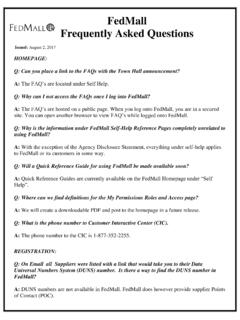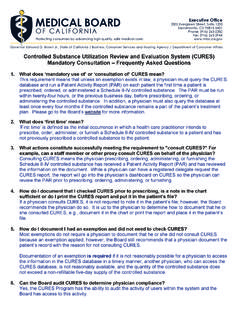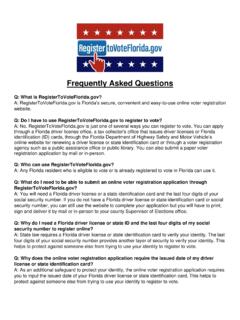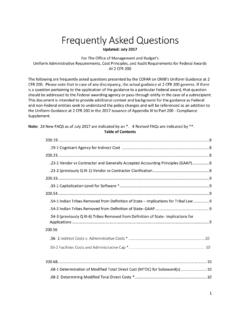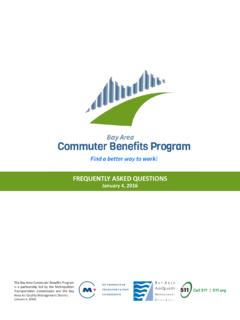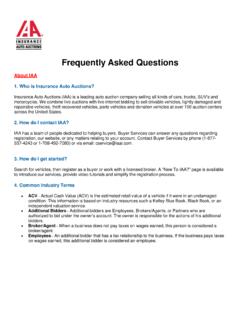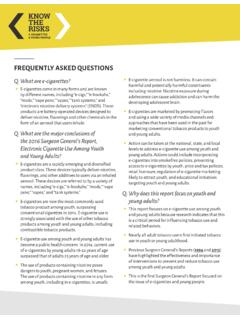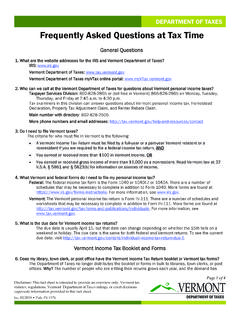Transcription of FREQUENTLY ASKED QUESTIONS - Kentucky
1 Kentucky Board of Alcohol and Drug Counselors PO BOX 1360 Frankfort, KY 40602 This document is to only be used as a guide, not an interpretation of the law. To read the law in its entirety see Kentucky Revised Statutes KRS to KRS and Kentucky Administrative Regulations 201 KAR 35:010 to 201 KAR 35:090. Page 1 of 5 FREQUENTLY ASKED QUESTIONS This document will be updated on an on-going basis. An e-mail to the Board Administrator is the best for QUESTIONS not answered on the website: The website is your one-stop-shop for laws, regulations, requirements, and application processes to name a few. , click on Resources. The applications also have information sheets, checklists, and spell out the next steps after you submit an application. Besides the new LCADC, LCADCA, and Peer Support Specialist Levels, what other major changes came with the new regulations?
2 Temporary Credentials Persons may apply for a temporary credential and provide alcohol and drug services under the auspices of the temporary credential. One might be a Temporary Alcohol and Drug Peer Support Specialist, or a Temporary CADC. During the time that one has a temporary credential, it is expected that the applicant will be operating under the direct supervision of a board approved CADC or LCADC supervisor. The direct supervision must be documented on the forms provided in the application of the credential they are working towards. The applicant will also be accumulating and documenting the required training hours. Having achieved all of the requirements, the applicant may apply for the credential he/she has been working towards, and no longer have a Temporary credential. Supervision Both the supervisor and the supervisory agreement must be Board approved before supervision begins.
3 At the time of application for the temporary credentials or an LCADC Associate, the applicant will be submitting the supervisory agreement. The Board will then notify the applicant after the supervisory agreement is approved. While obtaining supervision, Annual Supervision Reports must be submitted to the Board. CADCs and LCADCs wishing to supervise must register with the board as a supervisor of record and submit the Request to Provide Supervision Form found on the website. All Board approved supervisors have 12 months from obtaining approval as a supervisor to attend an initial, one-time, board approved training session in supervisory practices. This training must be offered by the Board; other supervision trainings will not count. If you are supervising candidates pursuing the LCADC, you MUST be a Board-Approved LCADC supervisor for those hours to count.
4 Supervision sessions occurring prior to the regulatory changes may count towards licensure, as long as the supervision was under a CADC in good standing with the board with at least 2+ years of post-certification experience. Kentucky Board of Alcohol and Drug Counselors PO BOX 1360 Frankfort, KY 40602 This document is to only be used as a guide, not an interpretation of the law. To read the law in its entirety see Kentucky Revised Statutes KRS to KRS and Kentucky Administrative Regulations 201 KAR 35:010 to 201 KAR 35:090. Page 2 of 5 What Credentials Does the Board Now Offer? Specific Requirements - Click On: Resources/ Kentucky Revised Statutes Applications - Click On: Resources/Applications & Forms Temporary Registered Alcohol and Drug Peer Support Specialist - High School Diploma or equivalent - Attest to being in recovery for a minimum of 2 years from a substance related disorder - Still obtaining the work experience, supervision, and training needed for the Registered Alcohol and Drug Peer Support Specialist - The period of a temporary credential is 2 years (one may apply for an extension)
5 Registered Alcohol and Drug Peer Support Specialist - High School Diploma or equivalent - Attest to being in recovery for a minimum of 2 years from a substance related disorder - Might currently be a Temporary Registered Alcohol and Drug Peer Support Specialist - Ready to take the Peer Support Specialist exam - Have already met the requirements for work experience, supervision, and training Temporary Certification as an Alcohol and Drug Counselor (Temporary CADC) - Bachelor s degree or higher - Still obtaining the work experience, supervision, and training needed for CADC or LCADC - The period of a temporary credential is 2 years (one may apply for an extension) Certification as an Alcohol and Drug Counselor (CADC) - Bachelor s degree or higher - Might currently be a Temporary CADC - Ready to take the Alcohol and Drug Counselor written exam - Have already met the required work experience, supervision, and training Licensure as a Clinical Alcohol and Drug Counselor Associate (LCADCA) - Master s degree (60 hr/30 hr advanced placement) or Doctorate in a behavioral science w/ clinical application - Still obtaining the work experience and supervision required for LCADC.
6 - Already have met classroom training requirements - Ready to take the licensure exam - May apply for LCADC after meeting the work experience and supervision requirements Licensure as a Clinical Alcohol and Drug Counselor (LCADC) - Master s degree (60 hr/30 hr advanced placement) or Doctorate in a behavioral science w/ clinical application - Ready to take the licensure exam (if have not already taken it) - Have already met the required work experience, supervision, and training Kentucky Board of Alcohol and Drug Counselors PO BOX 1360 Frankfort, KY 40602 This document is to only be used as a guide, not an interpretation of the law. To read the law in its entirety see Kentucky Revised Statutes KRS to KRS and Kentucky Administrative Regulations 201 KAR 35:010 to 201 KAR 35:090. Page 3 of 5 Application - Click On: Resources/Applications & Forms.
7 Will my CADC or LCADC be accepted by Medicaid? The Board is not able to answer billing QUESTIONS . It is recommended to contact your agency, employer, and/or Medicaid directly for answers to these QUESTIONS . I am not yet ready to submit my CADC application because I have more hours to obtain. Should I apply for the Temporary CADC? Yes. This is one of the biggest changes for the ADC Board. Before, you would not send in an application until you had all of your hours completed and were ready to take the exam. Now, if you are under supervision and working, you must register with the Board in some capacity. This is why the Temporary credentials were created. I am applying for the LCADCA (Associate). Once I pass the exam, do I have to take another one for the LCADC? No. There is only one exam for Licensure. It is the Advanced level exam which is different than the CADC exam.
8 If you pass the Licensure exam and become an LCADCA, you will NOT need to take another exam to become a LCADC. All you would need to do is finish obtaining the required hours of supervision as an LCADCA before sending in your application for the LCADC. How Do I go about finding a Board approved Supervisor? A list is available on the website. You may visit and look for the Board Approved Supervisors Listing . It is organized by city and will be updated FREQUENTLY . Kentucky Board of Alcohol and Drug Counselors PO BOX 1360 Frankfort, KY 40602 This document is to only be used as a guide, not an interpretation of the law. To read the law in its entirety see Kentucky Revised Statutes KRS to KRS and Kentucky Administrative Regulations 201 KAR 35:010 to 201 KAR 35:090. Page 4 of 5 My Check Was Cashed. Why Haven t I Heard Anything from the Board?
9 Checks are not processed at this office they are sent off to the Treasury before the Board Administrator even receives the applications/documentation. Upon mail arriving at our office, all checks are entered by the fiscal department and sent to the Kentucky State Treasury for processing. If your application is received by our office at least 10 days prior to the regularly scheduled Board meeting, then it will be reviewed at that meeting. It takes approximately 2 weeks for correspondence regarding your application to be mailed. Board Meeting dates can be found on the Board s website under Quick Links on the right-hand side. CEU Application Guidance: There has been some confusion in distinguishing between what constitutes a workshop and what constitutes a course of study. A workshop is a single educational offering that takes place on a single day or consecutive days.
10 It can also be an educational offering that contains multiple topics and presenters that takes place within a specific period of time, such as the Kentucky School of Alcohol and Other Drug Studies or CAPTASA. A course of study is multiple workshops offered at separate times over an extended period of time: Example are staff development and training events that cover multiple topics occurring on separate days over a period of six months or a series of on-line CEU trainings that are available over a year. The distinction is that these workshops are not part of a single or consecutive day event. How do I extend my temporary credential? Temporary Credentials Expire after 2 years. If you need more time to be under your Temporary Credential, here are instructions to request a two year extension: 1. It is recommended to submit this request online via your eServices account 1-2 months prior to your expiration date, so you can obtain the approval for your extension prior to it expiring.




